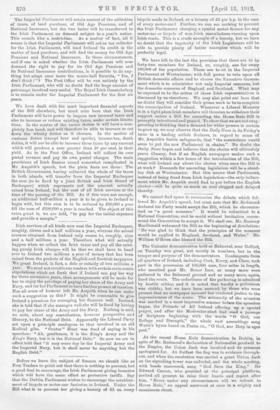We have left to the last the provision that there
are to be forty-two members for Ireland, or, roughly, one for every 100,000 of the population. These are to sit in the Imperial Parliament at Westminster, with full power to vote upon all British domestic affairs and to choose the Executive Govern- ment which is to administer . not only Imperial concerns, but the domestic concerns of England and Scotland. What may be expected to be the action of these Irish representatives is discussed by us elsewhere. We may also point out here that no doubt they will consider their prime work to be to complete the emancipation of Ireland. Whenever a Liberal Ministry is in a tight place Irish members will threaten to withdraw their support unless a Bill for amending the Home Rule Bill is promptly introduced and passed. To show that we are not exag- gerating in thinking that a. demand for wider powers is certain to grow up, we may observe that the Daily News in its Friday's issue in a leading article declares, in regard to some of Mr. Asquith's feeble safeguards, that " the restrictions would seem to put the new Parliament in chains." No doubt the Daily News hopes and believes that the chains will ultimately prove illusory, but if an English newspaper makes such a suggestion within a few hours of the introduction of the Bill, what will Ireland say about the chains when once the Bill is at work P Demands for amending legislation will be a stand- ing dish at Westminster. But this means that Parliament, instead of being freed from Irish Legislation—the only induce- ment which Mr. Asquith could find to put before the English elector—will be quite as much as ever clogged and delayed thereby.






































 Previous page
Previous page